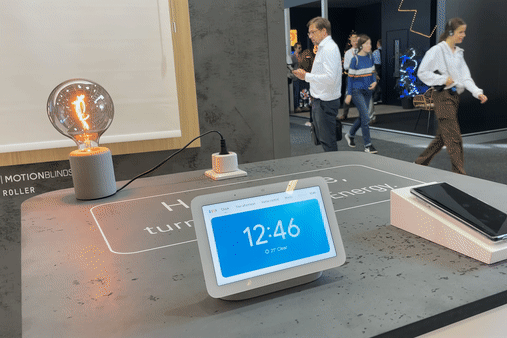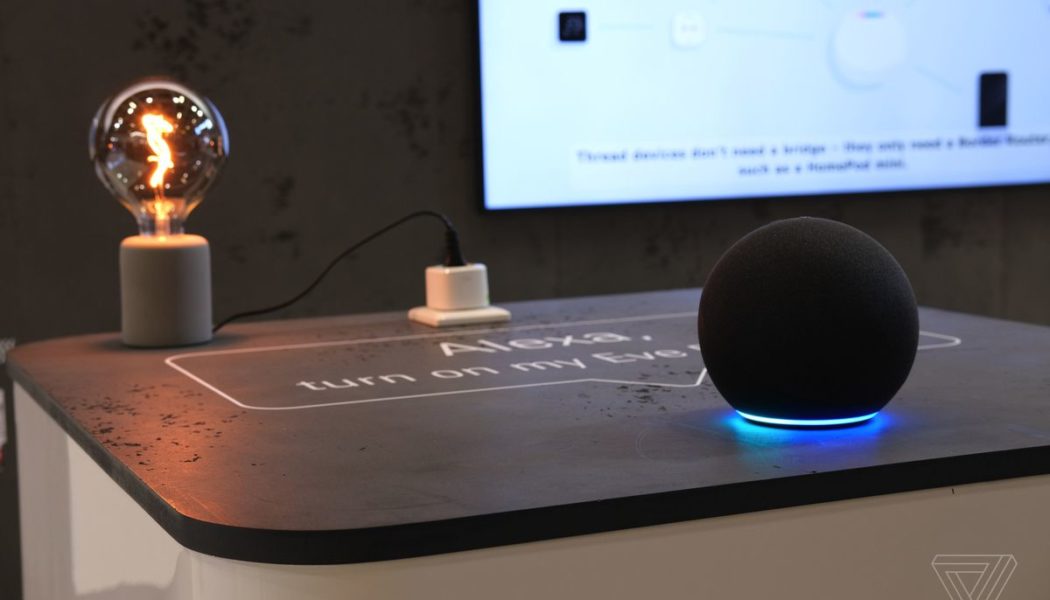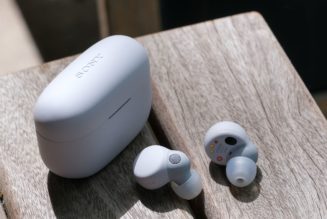Matter, the upcoming standard that’s attempting to give the smart home a single unifying language, is almost here — and I was just treated to an early demonstration of the kinds of cross-platform compatibility that it should enable in the future. The demonstration was given by Eve, which produces a range of smart plugs, radiator valves, lighting, and security devices.
Historically, Eve has only ever worked with Apple’s HomeKit smart home platform. This is because it didn’t want to use cloud-to-cloud platforms, preferring to keep its devices on locally-controlled platforms for privacy and security. Eve has had an iOS app but no Android app, and it didn’t support Samsung’s SmartThings, Amazon’s Alexa, or Google Home. So it was notable to see all four platforms represented as I approached Eve’s booth at the IFA trade show in Berlin.
The reason for the shift is Matter. It’s perhaps the most significant thing to happen to the smart home since its inception, and in theory, we’re just months away from it becoming publicly available. Eve also announced it’s launching an Android app as a counterpart to its existing iOS app, but the big deal with Matter is that you don’t technically need a device manufacturer’s app at all. You can just set up and control your Matter-enabled devices with existing apps, whether it’s Apple HomeKit, Google Home, Amazon Alexa, or Samsung SmartThings apps.
That’s exactly what Eve was demonstrating at IFA. The Matter specification hasn’t been finalized yet, so none of the devices were running their final Matter-enabled firmware, but it was enough to see the kinds of functionality we might be able to expect when Eve’s devices get updated to support it.
:no_upscale()/cdn.vox-cdn.com/uploads/chorus_asset/file/23992343/Watermarked4DSCF0561Jon_Porter.jpg)
The Amazon table contained a fourth-generation Echo speaker, along with a typical non-smart bulb plugged into an Eve Energy smart plug. Right now, Echo speakers can’t control Eve products, because the latter aren’t Alexa-enabled. But both products are compatible with Thread, one of the wireless protocols Matter works over and which can run locally. Eve was showing off how Matter will enable these two previously incompatible devices to speak to one another.
Eve’s booth reps were pretty insistent that no one other than them uses voice commands to control each of their smart plugs, so I was reliant on them to issue the commands that would control Eve’s devices. “Alexa, turn off my Eve Energy,” one rep asked a fourth-generation Amazon Echo. After an (admittedly quite long) beat, a bulb plugged into an Eve Energy smart plug clicked off.
Matter’s design makes it simple and seamless for users across different platforms to control the same smart home products natively. The result is a more cohesive experience, where whichever voice assistant you choose to use can control all your Matter-enabled devices and where configuration changes made to a device via one ecosystem will automatically be reflected everywhere else. Each of the four demo stations was using the same model of Eve Energy smart plug, without the need for separate models for different ecosystems. Because the accessory already supports Thread, updating it to support Matter was a relatively seamless process, Eve’s PR Director Lars Felber tells me.

On the Google table, there was both a Thread-enabled second-generation Nest Hub and a Google Pixel 6 Pro running the Google Home app. First, Felber told the Nest Hub, “Ok Google, turn on my lights.” The instant the Google smart display recognized the command, the Eve Energy smart plug behind it clicked on the attached light bulb. The smart display had sent a signal to the smart plug over Thread to turn it on, thanks to Matter.
Using the Android phone running the Google Home app was less seamless in my demonstration. “Phones don’t do Thread,” Felber explained to me. As a result, the handset needed to communicate with the Nest Hub over a local Wi-Fi network for the smart display to send the command to the smart plug via Thread. Unfortunately, attempting to control the smart plug from the phone straight up didn’t work. The icon on the phone responded to my taps, but the light remained unchanged.
It was a shame to not see Matter working flawlessly, but trade show floors are admittedly one of the worst possible places to demonstrate technology like this. Felber told me that there were around 50 overlapping Wi-Fi networks in the trade show hall we were in, and even the least congested Wi-Fi channel still had nine devices on it. The Thread protocol also uses the same 2.4Ghz frequency as Wi-Fi, resulting in more interference. The amount of noise also made issuing voice commands difficult without yelling inches away from the stand’s various smart speakers. Plus, the Matter standard currently isn’t final — so some bugginess is perhaps to be expected.
:no_upscale()/cdn.vox-cdn.com/uploads/chorus_asset/file/23992344/Watermarked5DSCF0565Jon_Porter.jpg)
A third table showed off Matter’s integration with SmartThings. Confusingly, there was only a single Samsung phone (a Galaxy S22) on this table, with no Thread border router in sight. But Felber confirmed to me that the company was using an Aeotec-manufactured SmartThings Hub — that for some reason was hidden inside the table — to transmit the signal to the Eve Energy. While totally misleading, the demo worked well. Using the SmartThings app to control the smart plug felt instantaneous.
Finally, there was the Apple table, the least surprising of the four because it demonstrated a hardware setup that the HomeKit-exclusive Eve lineup already supports just fine — albeit now updated to use Matter rather than just Apple’s HomeKit. Alongside the smart plug and bulb on that table was an iPhone 13 and a HomePod Mini smart speaker acting as a Thread border router. Controlling the smart plug via either was very responsive.
:no_upscale()/cdn.vox-cdn.com/uploads/chorus_asset/file/23992342/Watermarked3DSCF0555Jon_Porter.jpg)
Although the launch of the Matter standard means Eve’s devices are about to get a lot more functional, existing owners shouldn’t need to buy new hardware to reap the benefits. Felber says Eve plans to push an OTA update to all its Thread-enabled products (which account for 14 of its 18-strong product lineup) to use Matter. The Eve Energy will be first, hopefully by the end of the year, with other devices like the Eve Door & Window, the Eve Weather, the Eve Motion, and the Eve Thermo following afterward.
Turning light bulbs on and off is a simple smart home party trick, and there are plenty of other examples of smart devices that work across different ecosystems. But seeing a currently Apple-exclusive accessory work (relatively) seamlessly across all these different ecosystems, with both voice and app control, has me pretty excited for what Matter might be able to achieve when it launches this fall.
Photography by Jon Porter / The Verge








